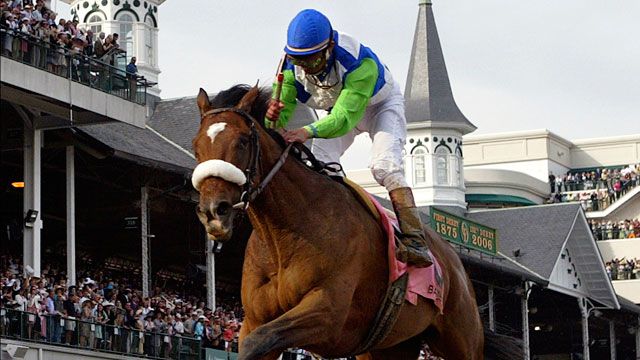
As a rule of thumb, we don’t cover politics as a horse race on this website, but with Saturday’s Kentucky Derby upon us — one of the few competitions where contestants have a legitimate right to behave like three-year-olds – we note this report from our colleagues at the Sunlight Foundation.
“The real money in the Kentucky Derby isn’t in the purse or the pari-mutuel, but in the politics,” Bill Allison writes. “Horse-focused PACs like the American Horse Council, the National Thoroughbred Racing Association and horse breeders and owners have contributed more than $8.7 million to political candidates and parties since 1989 and spent $2.2 million more lobbying. And some of the top donors to these organizations are mega-donors in their own right, having contributed millions more to politicians, parties, PACs and super PACs.”
Those high rollers include Robert L. Duchossois, whose company, PAC, employees and family have contributed $4.7 million “to politicians, party committees and super PACs” (including Karl Rove’s American Crossroads and the pro-Romney Restore Our Future super PACs); Ramona Bass, wife of Lee Bass of Bass Brothers Enterprises, the oil and investment magnates ($2.3 million in political contributions); and NFL team owner Robert McNair ($2.5 million in contributions). Lee Bass and McNair made significant contributions to the Rick Perry campaign. Sunlight reports:
“Lobbyists for horse owners, breeders and racers have secured multiple tax benefits from a host of bills, including small-bore measures like the Equine Equity Act, part of which was rolled into and passed as part of the 2008 Farm Bill, and broad legislation like the $787 billion American Recovery and Reinvestment Act, which, among its many provisions, offered accelerated depreciation benefits to horse owners. Race horses also get special tax considerations, and in 2010, when Congress passed a bill to extend unemployment benefits for workers who lost their jobs in the Great Recession, extending the tax break for owners of colts and fillies, mares and stallions for two years was included as part of a package of special interest provisions.”
Kentucky’s own, Senate Minority Leader Mitch McConnell — who introduced the Equine Equity Act — is the #1 recipient of campaign contributions from the horse breeding industry, receiving more than $130,000.
One of the GOP’s top money raisers, a staunch opponent of campaign finance reform and defender of the Citizens United decision, McConnell recently filed a legal brief with the Supreme Court that, according to David Firestone of The New York Times, is “blind to how unlimited contributions damage the political system. Not only is there no reason for the court to reconsider or overturn its 2010 Citizens United ruling, [McConnell] wrote, but the events of the last two years actually support the correctness of the decision…
“[The]wash of money, most of it buying attack ads, actually pleases Mr. McConnell, who sees it all as an exercise of speech (by those who can afford to speak in this way, most of whom happen to be Republicans). In his brief… he says the money has allowed ‘far more political speech in 2012 than would otherwise have been the case,’ making the campaign less predictable and more interesting. (In fact, predictably, the guy with the most money won the Republican nomination.)”
By the way, Senator McConnell comes by his interest in horseflesh naturally. Not only does he live in Louisville, home of the Kentucky Derby’s Churchill Downs, he first gained national attention in 1977 with a notorious, equine-related campaign commercial. As Michael Warren observed in the conservative National Review in 2009,
“He won his first race for political office — Jefferson County judge — over incumbent Todd Hollenbach largely thanks to one effective television advertisement. The ad, ‘Horse Sense,’ used a down-home farmer to counter Hollenbach’s dubious claim that he was a tax cutter. The farmer said, ‘Maybe Hollenbach ought to have my job, because in my business, I deal with that kind of stuff every day,’ tossing a shovel of manure toward the camera as he spoke.”

